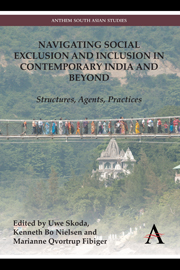 Navigating Social Exclusion and Inclusion in Contemporary India and Beyond
Navigating Social Exclusion and Inclusion in Contemporary India and Beyond Book contents
- Frontmatter
- Contents
- Acknowledgements
- List of Contributors
- 1 Introduction: Navigating Exclusion, Engineering Inclusion
- Part I Spaces and Values
- Part II Communities and Politics
- 5 In Search of Development: Muslims and Electoral Politics in an Indian State
- 6 Exclusion as Common Denominator: Investigating ‘Dalit-hood’
- 7 Inclusion of the Excluded Groups through Panchayati Raj: Electoral Democracy in Uttar Pradesh
- 8 Making Sikkim More Inclusive: An Insider's View of the Role of Committees and Commissions
- 9 Encountering ‘Inclusion’ and Exclusion in Postindustrial Mumbai: A Study of Muslim Ex-millworkers' Occupational Choices
- Part III Resources and Development
7 - Inclusion of the Excluded Groups through Panchayati Raj: Electoral Democracy in Uttar Pradesh
from Part II - Communities and Politics
Published online by Cambridge University Press: 05 September 2013
- Frontmatter
- Contents
- Acknowledgements
- List of Contributors
- 1 Introduction: Navigating Exclusion, Engineering Inclusion
- Part I Spaces and Values
- Part II Communities and Politics
- 5 In Search of Development: Muslims and Electoral Politics in an Indian State
- 6 Exclusion as Common Denominator: Investigating ‘Dalit-hood’
- 7 Inclusion of the Excluded Groups through Panchayati Raj: Electoral Democracy in Uttar Pradesh
- 8 Making Sikkim More Inclusive: An Insider's View of the Role of Committees and Commissions
- 9 Encountering ‘Inclusion’ and Exclusion in Postindustrial Mumbai: A Study of Muslim Ex-millworkers' Occupational Choices
- Part III Resources and Development
Summary
This chapter examines to what extent the new panchayati raj, through the 73rd amendment to the Indian constitution in 1993, has led to greater inclusion of hitherto excluded social groups in the institutions of local government and decision-making processes. In June 1994 the government of Uttar Pradesh (UP), the largest state of the Indian republic, amended the UP Panchayat Act of 1947 to extend the recently implemented 27 per cent quota for the Other Backward Classes (OBCs) in administration and education to panchayati raj institutions (PRI). At the same time, the UP government also made the reservation of seats for the Scheduled Castes (SC) (in proportion to their demographic profile) and women (33 per cent) mandatory at all levels of the panchayati raj system in accordance with the 73rd amendment. Besides devolving governmental power to the village level, this amendment also aimed at ensuring the participation of hitherto excluded castes and social groups in decision making.
In this chapter I examine the results of these policies. I am specifically concerned with two simultaneously occurring processes: on the one hand, I examine how these policies have facilitated the inclusion of hitherto excluded social groups. This had led to a marked change in the relations of domination and subordination between the upper castes and the OBCs both in UP and North India more broadly. On the other hand, I analyse how this ‘politics of inclusion’ has also produced new patterns of political exclusion.
- Type
- Chapter
- Information
- Navigating Social Exclusion and Inclusion in Contemporary India and BeyondStructures, Agents, Practices, pp. 119 - 134Publisher: Anthem PressPrint publication year: 2013


